CBN is not the same as CBD. CBD is a major cannabis compound that is well known for its potential health benefits. After years of CBD being the main topic of the cannabis conversation, there’s another cannabinoid that’s gaining people’s attention: CBN.
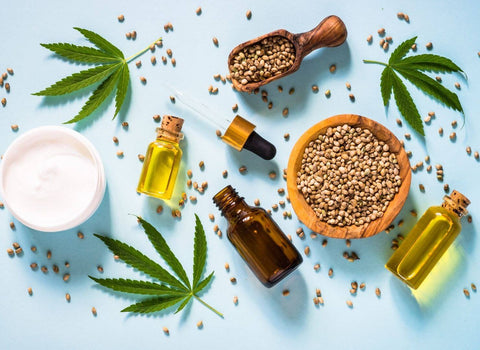
As more people discover the positive effects of CBN, they’re wondering how it differs from CBD. Despite these cannabinoids deriving from the same plant, the two have distinct properties and chemical structures. Let’s break down CBD vs. CBN to assess their similarities and differences.
If you want to try CBN and CBD, try our sleep gummies.
What is CBN?
Cannabinol (CBN) is a minor cannabinoid in the cannabis plant that is formed when tetrahydrocannabinol (THC) oxidizes. While extremely high levels of CBN could cause mild psychoactive effects, normal doses shouldn’t get you high.
Our vegan CBN gummies are an ideal sleep companion, with just 5 MG of CBN to help calm your racing mind and help you get a good night’s rest.
What is CBD?
Cannabidiol (CBD) is one of the major cannabinoids in cannabis out of over 100 that have been identified. It is a non-psychoactive, well-tolerated compound.
Our collection of vegan CBD gummies is carefully-sourced from high-quality hemp CBD. All of our CBD products are made in compliance with the 2018 Farm Bill.
What is the Difference Between CBN and CBD?
Both CBD and CBN products come from the cannabis plant (cannabis sativa, cannabis indica, and cannabis ruderalis). The main difference between CBN and CBD is that CBD is extracted directly from the plant, but CBN is a byproduct of THC. CBD and CBN each interact with the body’s endocannabinoid system (ECS) to initiate their effects, but the way they interact with this system is different.
The Endocannabinoid System
The ECS is a cell-signaling system that regulates several physiological processes in the body, including pain, appetite, mood, anxiety, immune function, and neuroprotection. Some research points to it also impacting reproduction and fertility, potentially playing a role in ovulation and sperm function.
This complex system is made up of neurotransmitters and cannabinoid receptors (CB1 and CB2). The ECS naturally produces neurotransmitters that send messages to the receptors for them to modulate specific activities.
The CB1 receptor is primarily located in the brain and central nervous system. It is closely involved with pain relief, mood regulation, appetite stimulation, memory and learning, and motor control. The CB2 receptors are mostly found in immune cells and the peripheral nervous system. It is most closely involved with regulating immune function, inflammatory responses, oxidative stress, and pain perception. Neurotransmitters bind to the CB1 and CB2 receptors to activate them.
Effects of CBN
Like neurotransmitters, CBN binds directly to the CB1 and CB2 receptors in the body.
Some of CBN’s benefits include:
- Reducing pain and inflammation
- Regulating emotions and focus
- Stimulating appetite
- Improve immune responses
- Supporting sleep
The potential benefits of CBN make it an option for people dealing with chronic pain and inflammatory diseases like multiple sclerosis, rheumatoid arthritis, and Crohn’s disease. The benefits of CBN’s sedative properties make it useful as a more natural, non-addictive sleep aid.
Effects of CBD
CBD’s influence on the ECS comes through a more indirect interaction and is known to “antagonize” the receptors rather than binding to them.
Some of CBD’s benefits include:
- Pain and inflammatory relief
- Relaxation and calmness
- Alleviate symptoms of depression and anxiety
- Treating epilepsy
- Increasing appetite
- Neuroprotection
The neuroprotective properties of CBD have been found to help treat neurodegenerative disorders like Alzheimer's and Parkinson’s disease. Scientific research about the benefits of CBD also shows this popular cannabinoid is effective in treating people with medical conditions like epilepsy because of its anti-inflammatory and antioxidant properties. CBD’s ability to offer relaxation may lead to sedative effects that improve sleep hygiene.
How Do You Take CBN and CBD?
Whether you’re thinking of taking CBD or CBN, there are many options available to you to achieve the potential health benefits of either cannabinoid. Cannabis products like oils, tinctures, and other liquid extracts are generally taken with a droplet under the tongue. You can also take CBN or CBD as a topical, applying it directly to the skin through a cream, lotion, or balm. Edibles offer a convenient, discreet, and easy to dose method of consuming CBN and CBD.
Though CBN and CBD are generally well-tolerable substances that will not get you high, it’s best to start with a low dose of whatever product you’re taking to avoid any adverse effects. You can slowly increase your dose over time if need be.
Try our Euphoria gummies in natural strawberry flavors with a custom formulated cannabis blend that is perfect for an uplifting experience.
Can You Take CBN and CBD Together?
Research claims that CBN and CBD work well when taken together. The health benefits of CBD are known to complement those of CBN when taking a broad-spectrum CBD product. These products contain a variety of cannabinoids, terpenes, and flavonoids but no traces of THC.
Our broad-spectrum CBD gummies can be taken at any time of day, helping to calm the mind and improve focus without causing any grogginess or sedation.
Research suggests that THC, CBN, and CBD are known to have a natural synergy, offering enhanced benefits in combination with each other. This is known as the entourage effect, a theory of how cannabis compounds multiply each other’s benefits when taken together. To achieve the entourage effect, take a full-spectrum CBD product. These products contain a variety of cannabinoids, terpenes, and flavonoids, including THC.
Even though the effects of THC are psychoactive, microdoses of THC are enough for you to get the benefits without the high. Microdosing is the practice of taking ultra-low doses of a substance to avoid risks and side effects. Read our guide to the benefits of microdosing THC to learn more about why you might want to take up the practice.
All of our full-spectrum CBD gummies contain 10 mg or less of THC. Whether for relaxation, a boost of energy, or help with sleep, our vegan, all-natural gummies have been third-party lab tested for quality assurance and compliance with federal law.
Is CBN vs. CBD Better for Pain?
Both CBN and CBD offer analgesic (pain-relieving) effects.
CBD is an anti-inflammatory. It can reduce pain caused by inflammatory diseases like arthritis and multiple sclerosis. Though some research suggests CBN has anti-inflammatory properties as well, research about its effects is still new. Similarly to THC, CBN is known to regulate pain perception by binding to the CB2 receptors that play a role in inflammation and pain.
A study entitled “Cannabidiol, cannabinol and their combinations act as peripheral analgesics in a rat model of myofascial pain” concluded that consuming CBN and CBD together could help people with myofascial pain syndrome. Combining the two with THC microdoses may provide the best pain relief of all.
Our Relax Plus Gummies might be just what you need to unwind your body.
Is CBD vs. CBN Better for Sleep?
CBD and CBN both seem to promote rest and relaxation, albeit in different ways.
CBD reduces stress and anxiety. This makes CBD useful for people who experience anxiety disorders and have trouble falling asleep because of them. People with insomnia often experience increased stress and anxiety and use CBD to calm their minds and bodies so they can fall asleep faster and stay asleep longer.
CBN is known to have sedative effects and could potentially increase the number of hours one sleeps without disturbance. This makes CBD useful for people with disorders like obstructive sleep apnea who are more likely to experience sleep disturbances.
Try our full-spectrum Sleep Plus Gummies to relax the mind before bed and ease your transition into a disruption-free sleep.
Product QUIZ
Need help deciding what product is best for you? Take our quiz, just three questions until your perfect match!
What is CBG?
Cannabigerol (CBG) is another minor cannabinoid found in cannabis that appears in low concentrations. Similarly to CBN, research on this cannabinoid is still in its preliminary phases with much to be discovered. Like CBN and CBD, it’s considered non-psychoactive and has potential anti-inflammatory and pain-relieving properties when interacting with the ECS.
CBG is derived from cannabigerolic acid (CBGA) and acts as a precursor to other cannabinoids. When a cannabis plant is first growing, CBG is formed first. As the plant matures, CBG is broken down into other cannabinoids like THC, CBD, and CBN.
What is CBDA?
Cannabidiolic acid (CBDA) is a minor cannabinoid that acts as the precursor to CBD. Through biosynthesis, CBGA becomes CBDA when the plant is raw and unheated. CBDA’s exposure to heat and light transforms it into CBD. CBDA is known to have similar effects as CBD, but research is still new. Some studies mention that CBDA has the potential to be just as potent as CBD.
What is CBC?
Cannabichromene (CBC) is a lesser-known cannabinoid found in cannabis. It is non-psychoactive and has potential analgesic and antibacterial properties. Medical research has shown that CBC selectively reduces inflammation-induced hypermotility, referring to inflammation in the digestive tract. This makes it useful for those who have Crohn’s disease and ulcerative colitis.
Are CBN and CBD Legal?
After the 2018 Farm Bill established a legal distinction between hemp and marijuana, hemp-derived cannabis products became federally legal. Hemp cannabis contains no more than 0.3% THC by dry weight and is federally legal, though some states do have their own restrictions on this. Marijuana is still federally illegal because it contains more than 0.3% THC by dry weight.
CBN and CBD FAQ
What does CBN do to the brain?
The CBN cannabinoid interacts with the cannabinoid receptors (CB1 and CB2) in the brain to regulate various physiological functions like mood, pain, and appetite. Its interactions with the CB1 receptors in the brain could be linked to the potential sedative effects of CBN.
What is CBN good for?
CBN is known to have potential benefits for several health conditions, like sleep, appetite, and pain relief. According to Forbes Health, research done by InMed Pharmaceuticals indicated that CBN could potentially treat glaucoma. CBN outperformed CBD and THC to protect cell survival when exposed to elevated eye pressure.
Will CBN get me high?
CBN is considered a non-psychoactive substance and is unlikely to get you high, unless you consume an extremely large dose at once.
Is CBD stronger than CBN?
CBD and CBN both have potential effects on the body due to their interactions with the endocannabinoid system. Research shows that CBD has a stronger affinity for cannabinoid receptors than CBN, potentially making it a more potent substance. Some people choose to use both cannabinoids together to get the enhanced benefits of the cannabinoids. Studies have shown that CBN, CBD, and their combinations act as peripheral analgesics for people with myofascial pain.
Will I fail a drug test if I take CBD?
CBD is a non-psychoactive, well-tolerated substance that is not checked for in drug screenings because it does not cause impairment. While using CBD isolate will not cause a failed drug test, using a full-spectrum CBD product could cause a failed drug test because it contains traces of THC.
Citations:
Farm Bill. (n.d.). Farm Bill | USDA. https://www.usda.gov/farmbill
Meccariello, R., Battista, N., Bradshaw, H. B., & Wang, H. (2014, January 16). Updates in Reproduction Coming from the Endocannabinoid System. PubMed Central (PMC). https://doi.org/10.1155/2014/412354
Silvestro, S., Mammana, S., Cavalli, E., Bramanti, P., & Mazzon, E. (2019, April 12). Use of Cannabidiol in the Treatment of Epilepsy: Efficacy and Security in Clinical Trials. PubMed Central (PMC). https://doi.org/10.3390/molecules24081459
Cannabidiol, cannabinol and their combinations act as peripheral analgesics in a rat model of myofascial pain - PubMed. (2019, August 1). PubMed. https://doi.org/10.1016/j.archoralbio.2019.05.028
Formato, M., Crescente, G., Scognamiglio, M., Fiorentino, A., Pecoraro, M. T., Piccolella, S., Catauro, M., & Pacifico, S. (2020, June 5). (‒)-Cannabidiolic Acid, a Still Overlooked Bioactive Compound: An Introductory Review and Preliminary Research. PubMed Central (PMC). https://doi.org/10.3390/molecules25112638
Izzo, A. A., Capasso, R., Aviello, G., Borrelli, F., Romano, B., Piscitelli, F., Gallo, L., Capasso, F., Orlando, P., & Marzo, V. D. (n.d.). Inhibitory effect of cannabichromene, a major non-psychotropic cannabinoid extracted from Cannabis sativa, on inflammation-induced hypermotility in mice. PubMed Central (PMC). https://doi.org/10.1111/j.1476-5381.2012.01879.x
nama CBD FDA & Legal Disclaimer
Our products are not intended to diagnose, treat, cure, or prevent any disease. They are not a replacement for prescription medications and have not been evaluated by the Food and Drug Administration (FDA).
The information provided on this website does not, and is not intended to, constitute legal advice or any statements of the status of any laws. Any information, content, and materials available on this site are for general informational purposes only, and are not intended to be relied upon for any purpose.
Readers of this website should contact their attorney to obtain advice with respect to any particular legal matter including decisions on what products are, or are not, legal to sell, possess, or consume. No reader, user, or browser of this site should act or refrain from acting on the basis of information on this site without first seeking legal advice from their own counsel in the relevant jurisdiction.
Only your individual attorney can provide assurances that the information contained herein—and your interpretation of it—is applicable or accurate for your particular situation. Use of, and access to, this website or any of the links or resources contained within the site do not create an attorney-client relationship between the reader, user, or browser, and website authors, contributors, contributing law firms, or committee members and their respective employers.
More articles
About
Learn
Join us on this journey

© Copyright 2025 nama Products LLC. All Rights Reserved.
†These statements have not been evaluated by the Food and Drug Administration. These products are not intended to diagnose, treat, cure or prevent any disease. All information presented here is not meant as a substitute for or alternative to information from health care practitioners. Please consult your health care professional about potential interactions or other possible complications before using any product.
††The information provided on this website does not, and is not intended to, constitute legal advice or any statements of the status of any laws. Any information, content, and materials available on this site are for general entertainment purposes only, and are not intended to be relied upon for any purpose.
123 John Doe Street
Your Town, YT 12345
Store Hours
Sun: Closed
Mon-Fri: 9:00 - 17:00
Sat: 10:00 - 13:00
What to expect at pickup
Closed
Closing at 5pm
Closing at 5pm
Closing at 5pm
Closing at 5pm
Closing at 5pm
Closing at 1pm

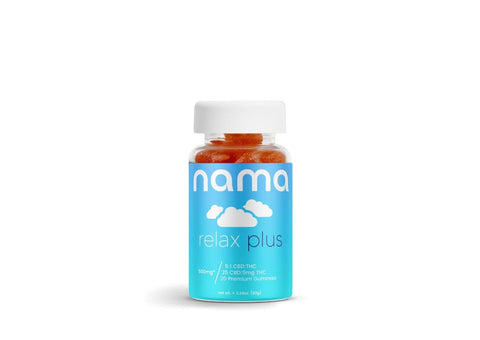
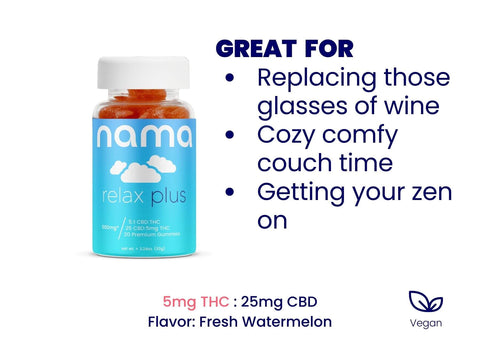
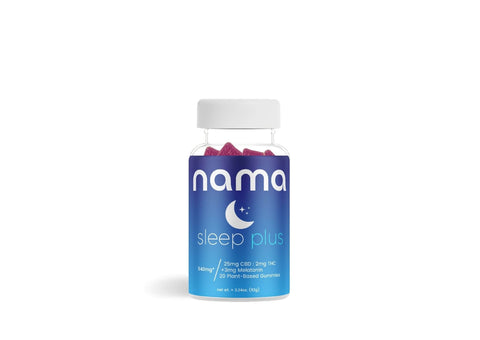
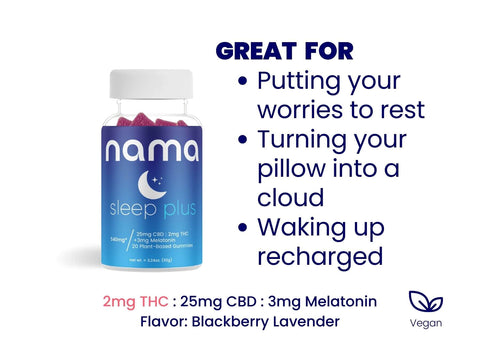
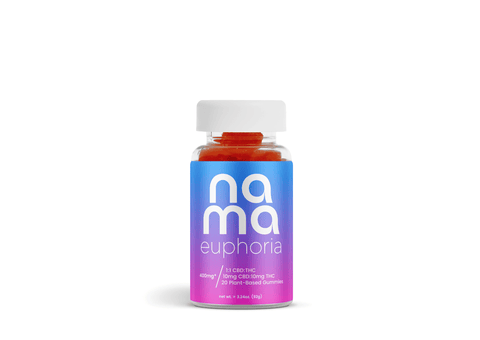
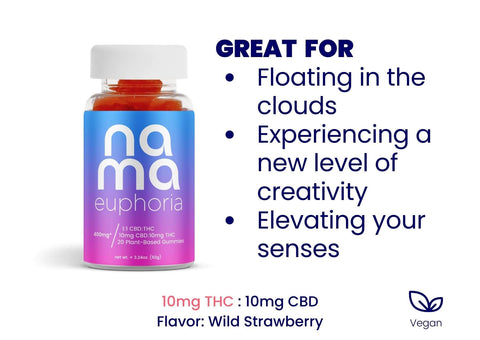
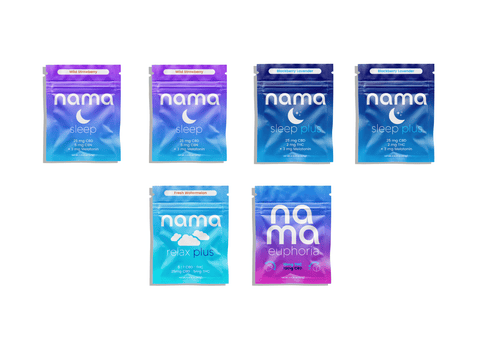
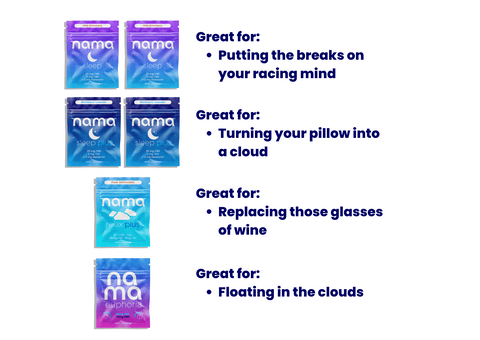
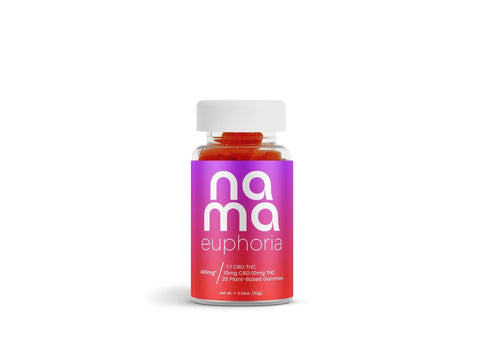
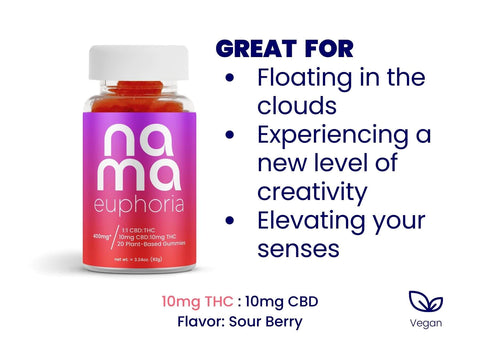
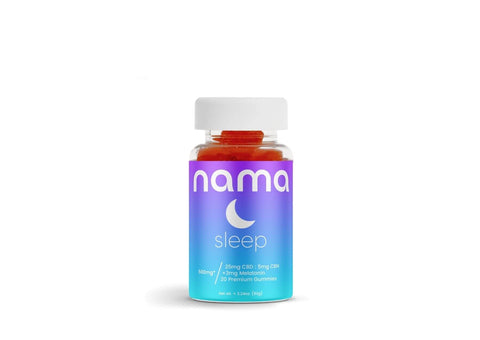
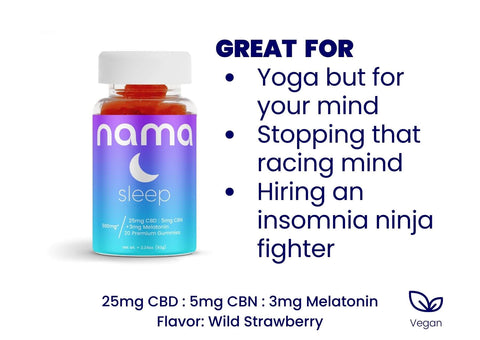
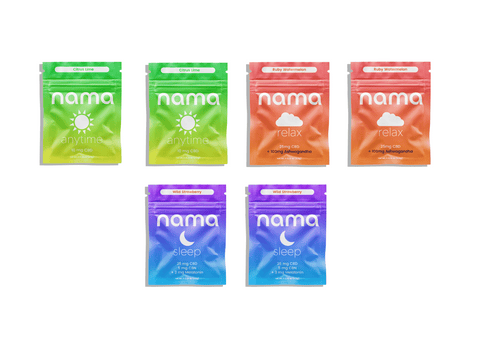
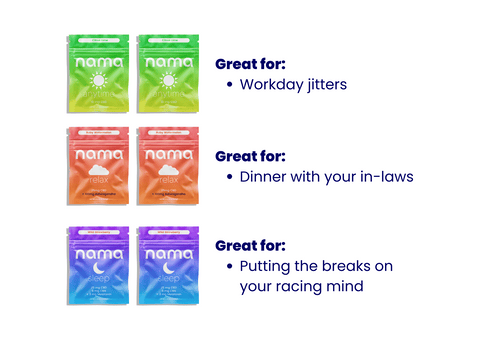









![Buzz Packs™ [THC and CBD Powder Drink Mix]](http://www.namacbd.com/cdn/shop/files/nama_buzz_packs_thc_drink_pack_white_background.png?v=1741884660&width=480)
![Buzz Packs™ [THC and CBD Powder Drink Mix]](http://www.namacbd.com/cdn/shop/files/Buzz_Packs_Label.png?v=1741884660&width=480)


![Buzz Drops™ [THC Drink Drops]](http://www.namacbd.com/cdn/shop/files/nama_thc_buzz_drops.png?v=1711412866&width=480)
![Buzz Drops™ [THC Drink Drops]](http://www.namacbd.com/cdn/shop/files/buzz-drop-wine-comparison.png?v=1736882023&width=480)






Comments (0)
There are no comments for this article. Be the first one to leave a message!